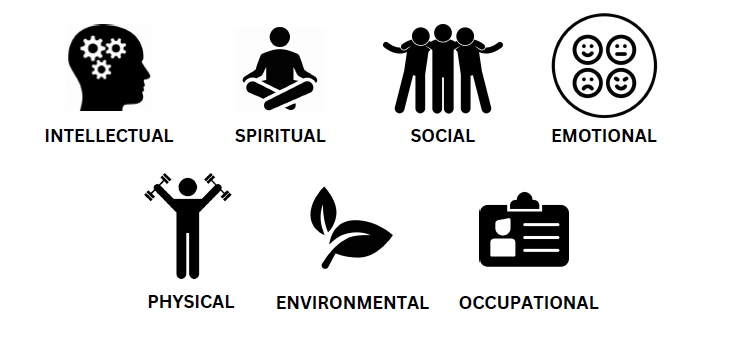
By Sydney Clevenger
Activities programs abound in senior living communities. But what makes for a strong program?
Residents seeking an elder living community should analyze the activities’ schedule to ensure at least one or more of the seven elements of wellness are evident within every activity, said Cedar Sinai Park Activities Manager Fabiana Dal Cero, who manages events for active assisted living residents at Rose Schnitzer Manor,
By Sydney Clevenger
Activities programs abound in senior living communities. But what makes for a strong program?
Residents seeking an elder living community should analyze the activities’ schedule to ensure at least one or more of the seven elements of wellness are evident within every activity, said
Cedar Sinai Park Activities Manager
Fabiana Dal Cero, who manages events for active assisted living residents at
Rose Schnitzer Manor, and post-acute, rehabilitation, and long-term care residents at
Robison Jewish Health Center/Harold Schnitzer Center for Living.
“It’s important for every elder activity to incorporate at least one element, if not more than one,” said Dal Cero. “Using the seven elements of wellness chart, helps us create fun and intellectual activities that are age-appropriate—not childish—that our residents can successfully do with a few adjustments, if needed.”
The seven elements of wellness include: intellectual, spiritual, physical, social, emotional, environmental, and occupational (see chart, at right)
Physical activities are fairly straightforward, said Dal Cero, but often need to be adjusted to accommodate walkers, weather, and motor skills. For example, a recent bocce ball activity at the Manor was held indoors due to the 95+ degree temperatures outside, and residents were able to stand, sit, or hold their walkers while participating, according to their abilities.
An intellectual event could be a discussion about books or current events, or attending a lecture, said Dal Cero. Occupational activities involve ‘fixing,’ projects, such as cooking or building. Spiritual activities could include religious services, worship referrals, and opportunities to speak to a chaplain or rabbi. Environmental activities incorporate nature such as gardening or recycling, and emotional activities include singing and musical instruments.
The majority of elder activities are inherently social, said Dal Cero, as they are a great way to make new friends, and most elder communities host parties and Happy Hours.
Living in a community with abundant activities can keep seniors socially active, right in their own home. And there is always a resident with whom one can find an activity in common.
Some elder communities, like the Manor, encourage residents to start clubs and share their knowledge and talents. One Manor resident, for example, is a geneticist, and her discussions on tomato hybridization and DNA topics are extremely well-attended. The Manor currently has a handful of resident-led club activities.
“No one wellness element is more important than another,” said Dal Cero. “We always try to ensure there is one element in an activity, and if we can have more than one element, that is even better, and we try to hit all of the elements within our dozens of activities campus-wide each week.
“The best activities incorporate a handful of the elements at one time, evoke childhood memories and traditions, offer purpose and movement, and give residents a chance to create and build lasting friendships. Elder communities should offer a variety of activities, and staff participation and engagement in resident activities is an indicator of a strong activities program.
“Activities are an important measure of quality of life,” added Dal Cero. “When you’re happy, listening to good music, chatting with friends, having a drink, and enjoying good food, the joyful environment is helpful for mental health and longevity.”
###
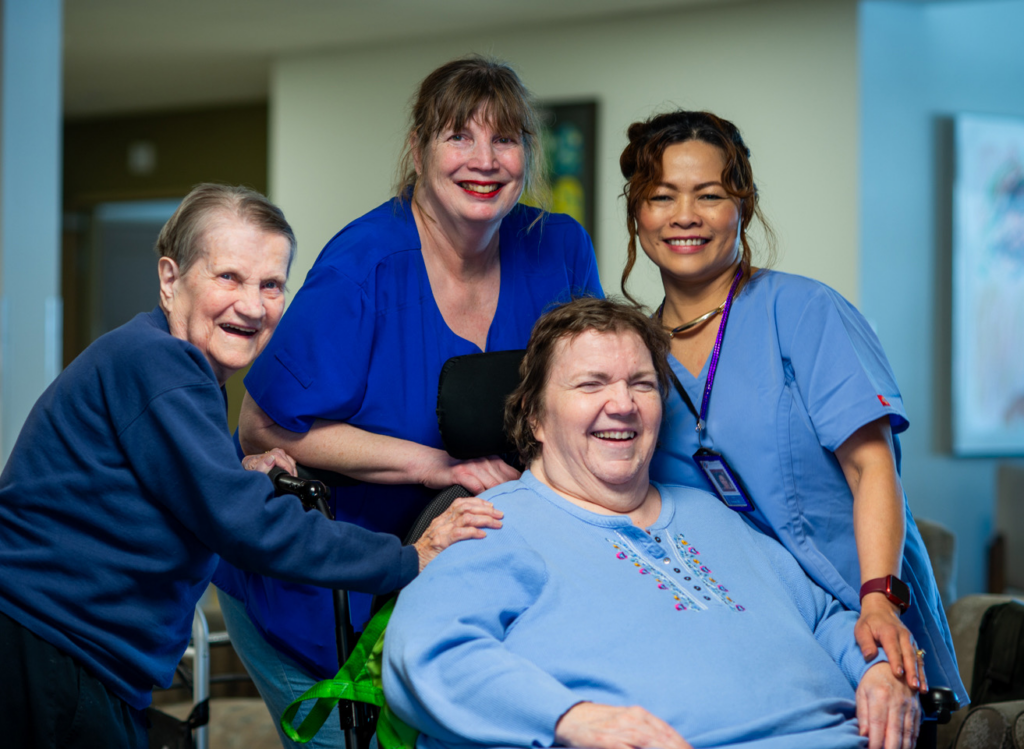
By Sydney Clevenger
Staff are essential to quality care in senior living communities. Elder residents who are able to become familiar with their same caregivers daily, feel more at home in their surroundings, and are more likely to ask for help when needed, or even better, have their needs met without asking.
“Having the same caregivers can really make a difference in a resident’s quality of life,” said Geneva Jacobs Dougal,
By Sydney Clevenger
Staff are essential to quality care in senior living communities. Elder residents who are able to become familiar with their same caregivers daily, feel more at home in their surroundings, and are more likely to ask for help when needed, or even better, have their needs met without asking.
“Having the same caregivers can really make a difference in a resident’s quality of life,” said
Geneva Jacobs Dougal, director of human resources at
Cedar Sinai Park, a senior community with 250 part- and full-time staff. “A caregiver who has been trained, and on staff for a while, will always be able to provide better care because continuity is important for elders, especially those with dementia or other cognitive needs.”
With staff turnover historically an issue for senior living communities, and one that can set the tone for an organization’s reputation, many senior communities wisely focus on staff training and retention.
“We put a lot of work upfront into making new employees feel welcome, and ensuring their questions are answered, and that they are comfortable,” said Jacobs Dougal. “Better employee morale typically translates to better resident care.”
One way to measure employee morale is in longevity, particularly in positions with high turnover such as housekeeping or culinary.
“Many senior communities contract out for services such as cleaning and maintenance and nursing because they have a hard time keeping qualified staff,” said Jacobs Dougal. “Residents at those communities may find contracted services have a different feel than services that are provided by in-house staff, who have more of a stake in outcomes.”
Cedar Sinai Park, which operates Rose Schnitzer Manor Assisted Living and Robison Jewish Health Center/Harold Schnitzer Center for Living, has long had a reputation for low staff turnover, and the trend continued after Covid. For example, said Jacobs Dougal, Cedar Sinai Park’s incredible building services team of 19 members, has an average tenure of 10 ½ years! The average tenure of all employees at Cedar Sinai Park is 5 years and 9 months, typically higher than the industry average in Oregon, and definitely nationally.
“Covid was rough on employees at senior living organizations, and many folks, particularly those in caregiving and nursing positions, left their fields entirely,” said Jacobs Dougal. “Most communities have bounced back from those days, but when touring a community, the longevity of staff is still an important question to ask.
“Employee tenure is a good benchmark for employee happiness, and consequently, quality of care.
“Friendly employees who look you in the eye during a visit and acknowledge that you are there, especially with a smile, also indicate a good vibe in a community,” said Jacobs Dougal. “Staff who have a good rapport and are communicating well with one another are another good indicator of employee morale.
“A good caregiver can become a loyal friend or family member. In selecting a senior community, it’s the one time elders are able to select their friends and family!”
###
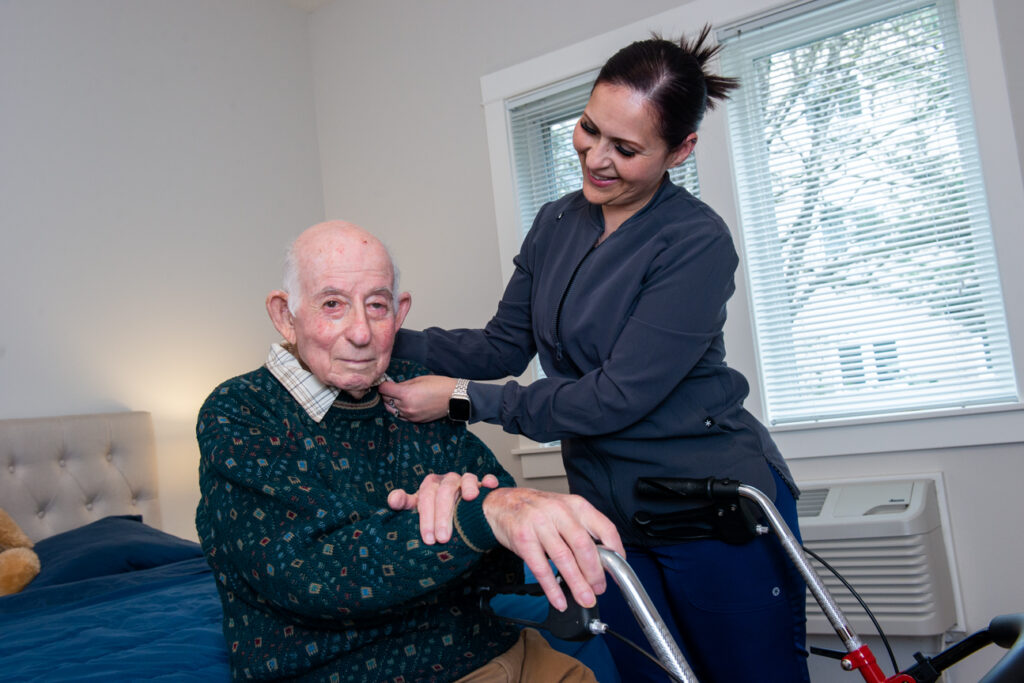
By Sydney Clevenger
With the cost of living rising, particularly in healthcare, more seniors are choosing to age at home. As often, families are moving in together with the younger generations caring for their aging elders. And the upcoming influx of baby boomers into the retirement age demographic, is expected to keep these trends increasing for at least a decade to come.
The trend in elders at home means an uptick in care programs that offer families respite,
By Sydney Clevenger
With the cost of living rising, particularly in healthcare, more seniors are choosing to age at home. As often, families are moving in together with the younger generations caring for their aging elders. And the upcoming influx of baby boomers into the retirement age demographic, is expected to keep these trends increasing for at least a decade to come.
The trend in elders at home means an uptick in care programs that offer families respite, said Cedar Sinai Park’s Director of
Sinai In-Home Care, Heather Hess.
“Families are needing a break,” said Hess. “We have noticed an increase in family caregivers needing respite services ever since Covid when people were afraid to leave their homes and extended families began living together to keep one another safe.
“In-home care offers flexible services to give families a break for a few hours once a week, or longer, as many days as are needed,” said Hess. “It’s super easy to get started, and in-home services offer consistency of care, which is important to aging elders.”
Hess said a rested family caregiver is in a better state of mind to deal with the challenges of an aging loved one, particularly if a dementia-related disease is involved. Often, the caregiving family needs tips to support their loved one with dementia, she said.
“I would ask a group providing in-home care: What specific trainings do your caregivers have? Are they hospice trained? Do they have Parkinson’s and dementia knowledge? What about brain injuries? And, then I would find out the caregivers’ overall level of training, such as how many hours of training caregivers are offered upfront, and then the hands-on training offered on an ongoing basis through their employment.”
Hess noted that all Sinai In-Home caregivers are trained in various dementia care approaches, including the nationally-recognized Positive Approach to Care.
“So, families learn from our team, as well as get the break they need, which is nice,” said Hess.
In addition to asking about an in-home caregiving company’s background, skill set, and training in dementia care, Hess advises people looking for a reputable group to ensure the service is licensed in the state in which they live. She also suggests asking agencies about their employee turnover rate.
“If an agency has caregivers that have been there for five years or longer, that’s amazing,” said Hess. “A number like that tells you a provider is doing something right: the employees are happy, and the clients are happy.”
Most in-home care agencies offer menu-based services, which means families can pick and choose what care is needed, how often, and what times and days. Sinai In-Home Care is generally available to take clients within a 50-mile radius, but each agency is different, said Hess.
“These are all very important questions, and it’s okay to shop around,” said Hess. “A reputable agency will be willing to answer all of your questions and, if they are not, that is a red flag. With society soon heading into one of the biggest dementia booms from the baby boomers, with a projected peak date of 2030, trained in-home caregivers will be essential.”
For more information about Sinai In-Home Care services, please go to
Sinai In-Home Care or call (503) 542-0088.
###
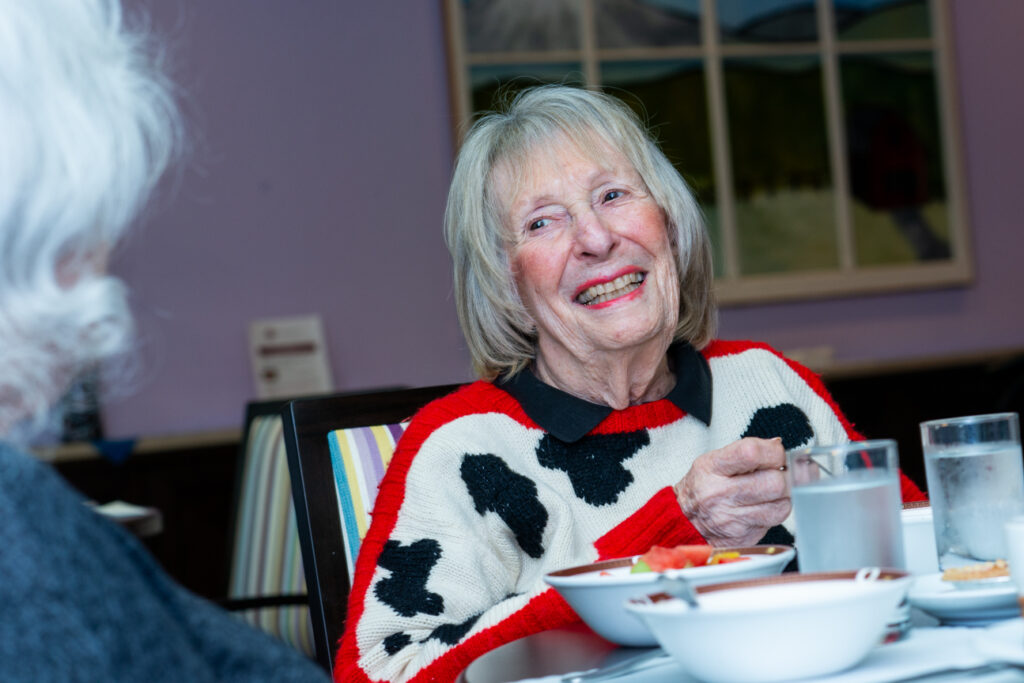
By Sydney Clevenger
With food often foremost on many elders’ minds, the most common questions about senior living revolve around dining.
“Food is really important,” said Andrea ‘Andy’ Staggs, executive chef and director of culinary services for Cedar Sinai Park, the community that includes Rose Schnitzer Manor Assisted Living and Robison Jewish Health Center/Harold Schnitzer Center for Living.
“Dining is social time, and food is essential for nutrition.
By Sydney Clevenger
With food often foremost on many elders’ minds, the most common questions about senior living revolve around dining.
“Food is really important,” said
Andrea ‘Andy’ Staggs, executive chef and director of culinary services for Cedar Sinai Park, the community that includes
Rose Schnitzer Manor Assisted Living and
Robison Jewish Health Center/Harold Schnitzer Center for Living.
“Dining is social time, and food is essential for nutrition. Many elders have dietary needs for good health. And then the cooking and sharing and eating of cuisine bring all kinds of memories for elders.”
Given the importance of food, Staggs has a few tips for elders and their families touring senior communities.
- Seek Meal Choices. Staggs says elders eyeing community living should look at how many food choices are offered per meal.
“There are some places where you are offered one dish per meal,” she said. “For some elders, one “choice” is fine, but others want a variety of options, so make sure to ask, so you don’t get bored with what is offered.
“At Rose Schnitzer Manor, for example, our menus change every week. We have multiple options per meal, and two specials of the day on top of those, plus a salad of the week, or a sandwich of the week. There is a lot of variety; more than what you would ever get going to the same restaurant every day.”
There should also be a good balance of healthy choices and fun choices, Staggs added.
- Are Dietary Needs Respected? It’s a good bet that a senior living community with gluten-free and low-sodium identifiers takes seriously elders needs for dietary restrictions, said Staggs.
“Elders will want to make sure they feel comfortable discussing any dietary challenges with the kitchen staff and those organizing the menu, so they get what they need at mealtime,” said Staggs. “As lifestyles and diets have changed, senior living kitchens need to change.
“We often provide counseling to residents who have specific instructions from their doctors about what they can eat, or should be avoiding, and those conversations are essential for person-centered care because they related to resident health and well-being. What one person can eat, not everyone else can eat.”
- When Can I Eat? Staggs says asking about the dining hours is a legitimate question. Many dining rooms are tightly scheduled as to when breakfast, lunch, and dinner are offered.
“Elders should take a look at the times dining is offered to see if they line up with when they might want or need to eat,” said Staggs. “And they should ask about whether there is food available to them in case the dining room is closed.”
For example, she said, there is always fruit, and often muffins and sandwiches and chips, available at Rose Schnitzer Manor between meals.
“Some communities are very strict about dining times, and what food is available between dining hours, and to dinner stragglers,” she said.
- Taste the Food! If an elder is on a tour, they should most certainly ask to sit down for a complimentary meal, said Staggs.
“It’s so important when you are on a senior community tour, to be treated as if you are a resident,” said Staggs. “Elders should be seated at a table and be able to order right off the menu, exactly as it is for that meal. When we have prospective residents with us, we give them the full dining experience, just as if they already live with us.
“There’s nothing like tasting the food to get a feel for whether dining at the community will appeal to your taste buds.”
###
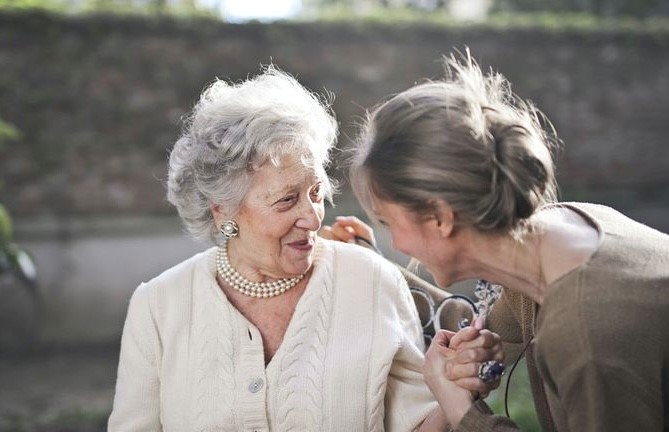
By Sydney Clevenger
Everyone can be forgetful at times. But as aging occurs, how does one tell the difference between momentary memory loss and the start of a degenerative brain disease such as dementia or Alzheimer’s? And what can be done to ensure elders who are experiencing dementia and Alzheimer’s maintain their quality of life, with respite for their caregivers?
The signs of dementia can be confusing, says Nancy Heckler,
By Sydney Clevenger
Everyone can be forgetful at times. But as aging occurs, how does one tell the difference between momentary memory loss and the start of a degenerative brain disease such as dementia or Alzheimer’s? And what can be done to ensure elders who are experiencing dementia and Alzheimer’s maintain their quality of life, with respite for their caregivers?
The signs of dementia can be confusing, says Nancy Heckler, director of Cedar Sinai Park’s Adult Day Services program, one of the Portland area’s premier day services for elders with dementia.
Signs of dementia, says Heckler, include memory problems—particularly in remembering recent events—along with increasing confusion, reduced concentration, personality or behavior changes, apathy and withdrawal or depression, and the loss of ability to conduct everyday tasks.
“The first thing I tell people who notice signs of dementia in their loved one is to have a doctor check them out,” says Heckler. “Often, their medications are wrong, or they need medication, or they have a urinary tract infection, which are very common, and can be easily treated for the elder population.
“Sometimes, a visit to a doctor can make all the difference,” said Heckler.
It is estimated that about 5.8 million people in the United States have Alzheimer’s disease and related dementias, including 5.6 million age 65 and older, and about 200,000 under age 65 with younger onset Alzheimer’s. By 2060, the number of Alzheimer’s disease cases is predicted to rise to an estimated 14 million people with minority populations affected most.
Dasha Kiper’s Travelers to Unimaginable Lands: Stories of Dementia, the Caregiver, and the Human Brain—Heckler’s recommended read for caregivers—says that human brains are programmed for social reasoning, and that if messaging from a loved one doesn’t make sense, we often try to fix the message with reality.
“Instead, the idea in the book is that caregivers should go along with whatever their loved one is saying,” says Heckler, “agreeing calmly, and trying to present solutions, even if what is being proposed makes no sense.”
Heckler gives the example of a program participant who thought she had taken his wife away. To honor his thoughts, Heckler said, “I didn’t take your wife, but let’s go find her.” A call was made to the participant’s wife, and he began to calm down, so Heckler suggested they go outside to wait for her.
“Caregivers should try to go with what their loved one is saying, and if that doesn’t work, take a step back and try different verbiage,” she said. “Caregivers need to stay calm, smile and make eye contact, and be agreeable to what is said, not try to reason with their loved one. Sometimes, silence or moving to a different environment works, too, because there is less stimulation, and what triggered them is no longer there, so the person begins to calm down.
“We get fooled as caregivers with glimpses of good times into thinking, ‘oh, it’s not that bad’,’ says Heckler. “And there are often longstanding familial patterns of communication that have formed between loved ones. Caregivers need to be realistic about what is happening, and make sure they do not make excuses for what is happening, and take time for themselves with breaks from caregiving.”
###
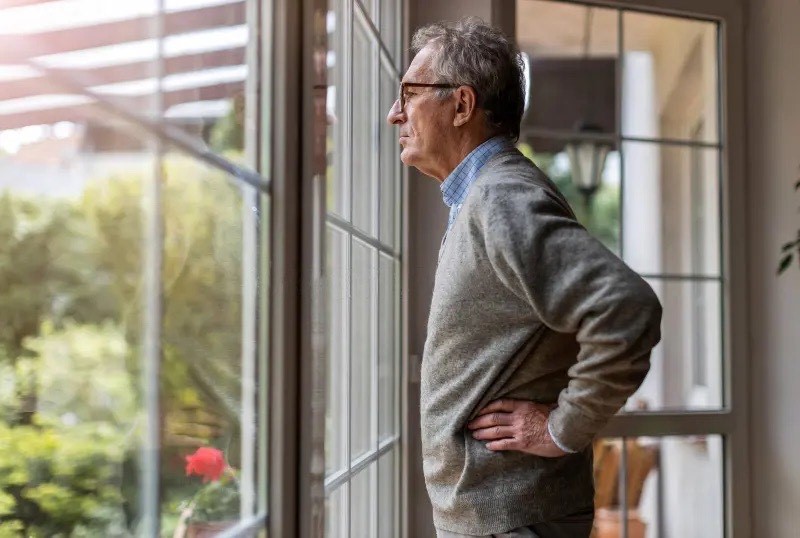
By Sydney Clevenger
The housing market is a far cry from the peak of two springs ago, with interest rates surging again, homes on average taking three months to go pending, and price growth either negative or anemic. Should elders sit out the current market watching and waiting for better times? Or should they look for other indicators to guide their decision on when to sell a long-time family home?
“I think a common sign that it may be time to move is if you start feeling afraid in your home,” said Cedar Sinai Park’s Rose Schnitzer Manor Active Assisted Living Community Outreach Coordinator Catherine Quoyeser.
By Sydney Clevenger
The housing market is a far cry from the peak of two springs ago, with interest rates surging again, homes on average taking three months to go pending, and price growth either negative or anemic. Should elders sit out the current market watching and waiting for better times? Or should they look for other indicators to guide their decision on when to sell a long-time family home?
“I think a common sign that it may be time to move is if you start feeling afraid in your home,” said
Cedar Sinai Park’s
Rose Schnitzer Manor Active Assisted Living Community Outreach Coordinator Catherine Quoyeser. “Beyond changes in feelings of personal security, if an elder finds upkeep onerous, or if the condition of the home is obviously suffering, it may be time to think about selling.”
Formerly a licensed realtor in Oregon with a certification as a senior real estate specialist, Quoyeser is used to advising elders on their home sales. When you have many years and lots of equity or ownership in a home – maybe even having paid off the mortgage – Quoyeser said there is little advantage in trying to time the market or wait for “the perfect time” to sell.
“For people who have been in their homes many years, I would tend to let the emotional factors guide decision-making, as opposed to what the market is doing at the moment,” said Quoyeser.
“Even though it’s less a seller’s market than it has been, local homeowners have seen excellent appreciation over the past 20 to 30 years. The key to realizing these gains is to keep your home well-maintained until whenever you’re ready to sell.”
Quoyeser said selecting a realtor, downsizing, packing, and moving can be overwhelming for many elders. It’s important to take the process in small steps.
For example, “it can be hard for people to winnow their accumulated belongings,” said Quoyeser. “But that process will help your home to sell faster and for a higher price since almost all buyers are drawn to properties that are tidy and minimalist inside and out.”
Quoyeser said seniors should also remember that they don’t have to go through the moving process alone.
“There are many folks out there who can help with downsizing, packing, and moving; and the best ones have different service offerings so you can choose how much help you need, whether it’s consulting for a few hours to create a plan that you can execute at your own pace, or someone who can come in and take care of the entire process from start to finish,” she said.
Managed Moves is one full-service organization dedicated to seniors that offers different packages, depending upon what type of help is needed, and the budget available.
Big Rocks Organizing is another reputable local company that helps with organizing, estate clearing, and moving.
Quoyeser also advises elders to work with a senior real estate specialist—that is, someone who is familiar with the distinctive needs of their age group.
“Typically, a senior real estate specialist will be familiar with elder services and be more sensitive and skilled in helping elders weather the challenges of a move,” she said, “and reach their goals for the next chapter of their lives.”

By Sydney Clevenger
With their many years of acquired wisdom, elders can teach younger generations a lot. But they can’t share if they are not informed.
“Many baby boomers are news junkies,” said Mitch Goldstein, a Life Enrichment Coordinator at Cedar Sinai Park‘s Rose Schnitzer Manor Active Assisted Living. “I learn so much about the world from them. They are such an untapped resource.
By Sydney Clevenger
With their many years of acquired wisdom, elders can teach younger generations a lot. But they can’t share if they are not informed.
“Many baby boomers are news junkies,” said Mitch Goldstein, a Life Enrichment Coordinator at
Cedar Sinai Park's
Rose Schnitzer Manor Active Assisted Living. “I learn so much about the world from them. They are such an untapped resource.
“But if an elder is isolated, they can’t share what they know. It’s important to engage them in conversations about current happenings.”
Goldstein coordinates a monthly round-up of events, mixing together recent news headlines with humor, trivia, notable birthdays, and questions to make participants remember, think, and share.
“Recently, it was the anniversary of Jimmy Durante’s birthday, and I had pictures of Jimmy on the screen, and everyone knew who he was and was reminiscing about his songs and television show,” said Goldstein. “It was a great way to trigger memories, and get everyone talking, and then thinking about today’s actors and comedians and singers.”
To keep up with current happenings, Goldstein recommends that elders join or start a group on current events, read national newspapers, go to the library, or have conversations with loved ones about what they’re reading and thinking.
“News Hour on Oregon Public Broadcasting has a good balance of information, covering all sides of current topics,” he said.
Coming together to discuss current events is not only educational, but social.
“About eight of us sat and kept talking in different groups after our last session, including my wife and I,” said Goldstein. “Elders are looking for opportunities to challenge their minds, in a setting where they can be informed, and are allowed to express themselves, and laugh about information they think is funny.”
One caveat about news sharing?
“The news seems so bad all the time,” said Goldstein. As much as it’s important to stay mentally connected, “it’s important for elders to take breaks from the news. Be sensitive to your own mental health needs, and care for yourself.”
Diane, for example, said she likes to stay up on what’s happening, but she limits her news consumption to radio only so she does not have to see visuals that could be upsetting. She prays for a better world, and says she is glad her children are strong people, as the news has not gotten better from the time she was a girl. She also loves Goldstein’s news sessions which she describes as “amazing.”
“We curate a lot to be sensitive, and try to strike a balance,” said Goldstein. “We have kibbitz questions that are taken from the headlines, and then people get to weigh in, and sometimes we split into groups and argue different sides. There are a lot of really smart people who offer their opinions.
“It’s a learning opportunity, but so fun. I love having conversations with everyone.”
###

By Sydney Clevenger, with research assistance from Rose Schnitzer Manor Active Assisted Living Resident Arlene Layton
If an elder can’t hear, it’s hard for them to participate in life. And poor hearing can increase elders’ risk of dementia.
That’s according to Darin Scheurer, owner of Portland, Oregon-based SmartStep Hearing.
“There are seniors who live in social isolation, or they are in a self-imposed isolation,
By Sydney Clevenger, with research assistance from Rose Schnitzer Manor Active Assisted Living Resident Arlene Layton
If an elder can’t hear, it’s hard for them to participate in life. And poor hearing can increase elders’ risk of dementia.
That’s according to Darin Scheurer, owner of Portland, Oregon-based
SmartStep Hearing.
“There are seniors who live in social isolation, or they are in a self-imposed isolation, because of hearing loss,” said Scheurer. “If we’re not hearing, we’re not stimulating the brain. Recent studies are showing that social isolation and isolation due to hearing loss can lead to cognitive decline.”
Results from a study of 575,000 elders over age 60 found that hearing loss was associated with an increased risk of dementia, compared with individuals who have no hearing loss, particularly amongst people not using hearing aids
(JAMA Otolaryngol Head Neck Surgical, January 2024). The researchers concluded that hearing aids might help or delay the onset and progression of dementia.
Additionally, researchers in
The Lancet Healthy Longevity journal recently reported that hearing aids can help lower the risk of early mortality, primarily because hearing aids can “help prevent or slow the progression of dementia.”
(Medical News Today, January 4, 2024)
Scheurer recommends that everyone over age 50 should have their hearing checked annually.
“Whether you go to Costco, a primary care doctor, an audiologist, a hearing aid specialist, or an ear, nose, and throat specialist, you will have access to a comprehensive hearing test that can offer good results and determine if a treatment for hearing loss is needed,” said Scheurer. “Statistically, by the time people are 65, one in three has hearing loss, and by age 80 it’s one in two. And 100 percent of 90-year-olds have hearing loss.
“So, a great first step for elders is to get their hearing tested, even if they think they hear well.”
Scheurer notes that when people begin to lose hearing, the high frequency end of the spectrum is affected sooner than the low end.
“That means seniors may be able to hear others who are six feet apart in a quiet room, but when they go into a large noisy room with a lot of people, they may instead hear mumbles.”
Scheurer says elders who are beginning to lose hearing have particular troubles with consonant sounds: letters like S, T, F, and K.
“Background noise is measured as a low frequency sound so if you’re hearing all the noise in the room just fine, but not the clarity of other people at your table in a noisy space, hearing loss is a strong possibility,” he said.
In a senior community, hearing loss can mean missed connections with friends and family, and the inability to fully participate in activities.
“Hearing aids can be expensive, and it takes time to adjust to them,” said Scheuer. “On the flip side, it’s really cool to be able to help someone with technology that is non-invasive and can make a real difference in their quality of life.”
###
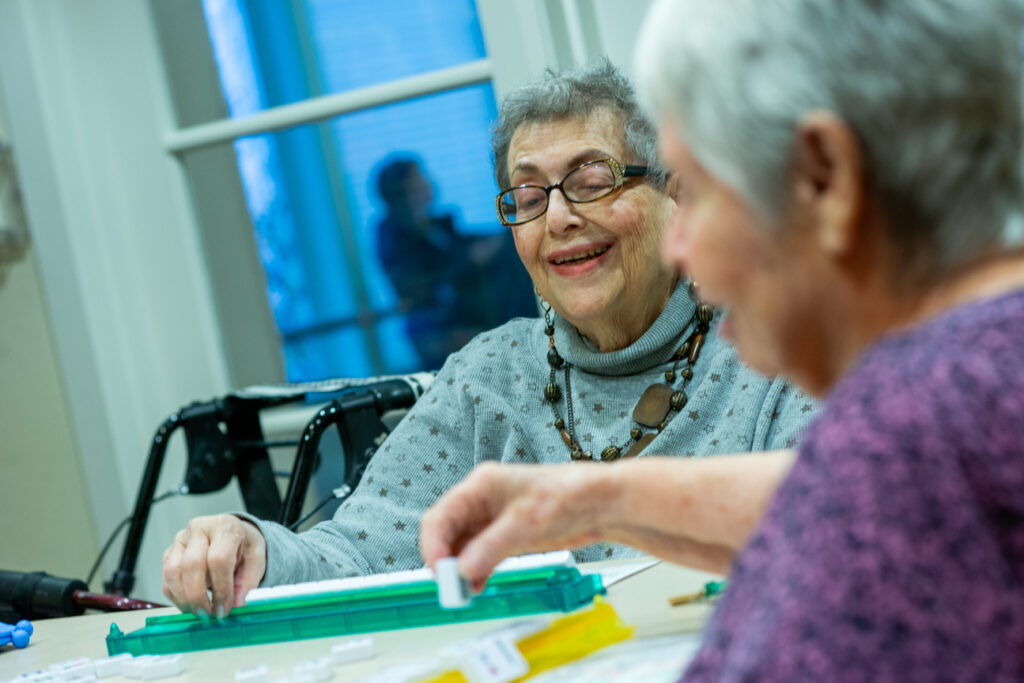
By Sydney Clevenger, with scheduling assistance from Rose Schnitzer Manor Active Assisted Living Resident Arlene Layton
With all that’s happening in the world, particularly since Covid, aging with grace has become an even tougher task.
What makes some individuals more resilient to life’s ups and downs?
We asked three elders at Cedar Sinai Park‘s Rose Schnitzer Manor Active Assisted Living—Eva,
By Sydney Clevenger, with scheduling assistance from Rose Schnitzer Manor Active Assisted Living Resident Arlene Layton
With all that’s happening in the world, particularly since Covid, aging with grace has become an even tougher task.
What makes some individuals more resilient to life’s ups and downs?
We asked three elders at
Cedar Sinai Park's
Rose Schnitzer Manor Active Assisted Living—Eva, Reva, and Eve— for tips on keeping positive, active, and engaged. That scheduling a get-together with the three ladies was a task unto itself—they had only a short window of time between a friends’ lunch, Mah Jong, and a mindfulness lecture—leads to tip number one.
- Socialization
Our seniors agreed that it is important to be independent, but also to have people around regularly.
“I thrive on people,” said Eva, 89. “I suggest for people to get involved and not live by themselves.”
Reva, 81, agrees that isolation can be a recipe for negativity. “Finding peers with whom to share and not depending upon your children for entertainment is important,” she said. “Sometimes, my daughter who lives in the town I live in will call and ask me to dinner. And I’ll say ‘Gee, I’d like to, but I’m doing such and such.’ That’s the kind of relationship I want. There are people where I live that I can talk to and socialize with and enjoy.”
Adds Eva: “I can’t imagine staying in a house by myself and thinking that’s good living. The TV doesn’t give much interaction. Here, I can walk out of my room and talk to the staff or visitors and it’s very nice.”
- Humor
Eva hails from California most recently, and Reva from Connecticut. They didn’t know each other previously before living in a senior community. But they hit it off right away due to their similar humor.
“I got here about a month before Reva did,” said Eva. “And when she came into the dining room, she was looking for a place to sit. She came to my table and we just hit it off. We’ve sat together ever since, and our group has grown. We just have a great time together. We love to confuse the servers when they ask our names since their names rhyme. We always say if we were ever in the same school at the same time, the two of us would have been expelled. We laugh a lot. It helps; it really does.”
- Purpose
For Reva, playing games like bridge, Scrabble, and Mah Jong keep her mind active. And she starts every day by playing a round of Wordle. “Got it in three this morning,” she said. “I did, too!” said Eva.
Eve, 94, suggests focusing on what you can do, and what you want to do, rather than what you can no longer do. “A woman came into my office when I was still working and said, ‘You know, my mother gets up in the morning and she goes into the bathroom, looks in the mirror, and says, ‘Oh, I’m so glad to see you!’ I thought that was a very good attitude,” said Eve.
Reva said elders should take the opportunity to try new experiences. She was recently inspired by a fellow resident who went to France at age 98 for a World War II ceremony.
“That made me think . . .maybe I could travel at age 98!” said Reva.
“Never say never,” added Eve.
###

By Sydney Clevenger, with research by Rose Schnitzer Manor Active Assisted Living Resident Arlene Layton
When searching for senior living, it’s important to consider potential costs beyond what’s quoted up front for rent. Many communities charge extra for health care, amenities like parking and package delivery, and even administrative services that seniors are used to receiving at no cost.
“Since every community handles amenities differently, we recommend that seniors touring independent and assisted living keep a check list of services that are critical to their day-to-day lifestyle so they know what to expect with cost before they put down a deposit,” said Cedar Sinai Park‘s Rose Schnitzer Manor Active Assisted Living Building Services Director Tammy Heard.
By Sydney Clevenger, with research by Rose Schnitzer Manor Active Assisted Living Resident Arlene Layton
When searching for senior living, it’s important to consider potential costs beyond what’s quoted up front for rent. Many communities charge extra for health care, amenities like parking and package delivery, and even administrative services that seniors are used to receiving at no cost.
“Since every community handles amenities differently, we recommend that seniors touring independent and assisted living keep a check list of services that are critical to their day-to-day lifestyle so they know what to expect with cost before they put down a deposit,” said
Cedar Sinai Park's
Rose Schnitzer Manor Active Assisted Living Building Services Director Tammy Heard. “So often we hear from residents about previous living experiences where they were shocked at all of the other costs added to the base monthly fee.”
That was the experience of Ann, who moved to a facility for its close-in parking, access to a full kitchen, and in-room washer and dryer unit.
“Parking close to the front door was important to me, so I was happy to pay extra for parking,” said Ann. “I was excited to have my own washer and dryer in my unit, but when they needed repair, I had to pay for the maintenance, which I didn’t know ahead of time.” As for the kitchen, Ann said she ended up needing room service more often than not, and was unaware that such a service would be extra.
Ann said she wished she’d asked about additional costs, like package delivery, which turned out to be $5 at minimum per package, and the availability of amenities like added storage, which was touted, but turned out to be unavailable due to a long wait list. There were also fees for administrative services like faxes and copying.
“If I was going to move again, I’d find out what incidental costs would be, and ask more questions,” she said.
Pete lived at a new facility in Seattle, with his wife, Jan, and was also struck by the hidden costs.
“The cost at our new place was 15 to 20 percent higher than other communities,” he said. “It was very expensive to rent monthly because it was new.
“And then after two years, it was obvious my wife needed more health assistance, and we had to go to an outside agency to find help on our own because there were no nurses on staff, which we didn’t know about ahead of time. They were also having trouble with staffing minimum wage jobs, and staff wasn’t always handy to help with even small tasks.
“The extra fees to pay for health care added up,” added Pete, who said those inquiring about senior living should think carefully about future needs, and what they might cost, as well as current ones. He added that senior living homes often have a buy-in, which is another financial piece about which to inquire.
“When we decided to move to Portland, we looked at several places, but chose one with many amenities included,” said Pete. “I feel very strongly it is the best choice we could have made.”












